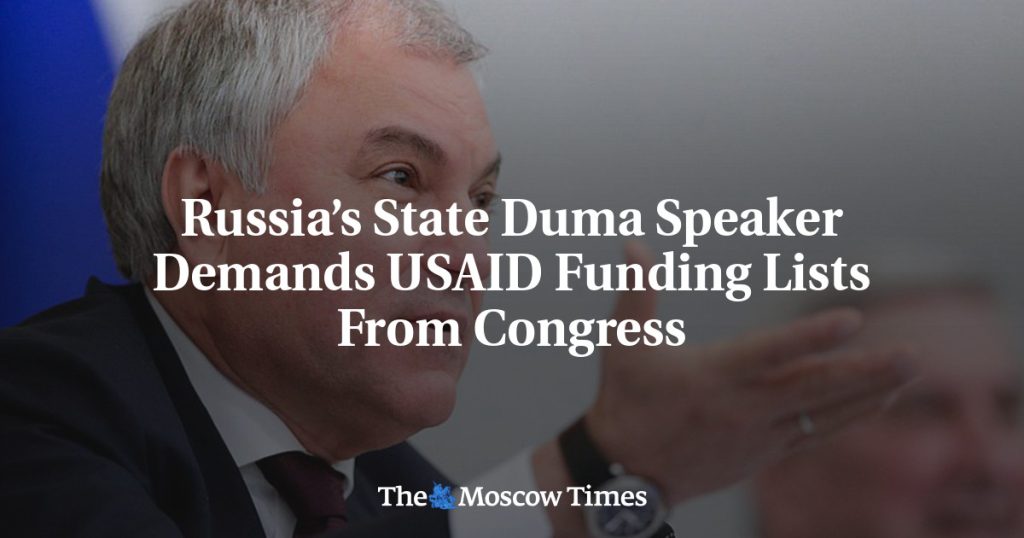Russian Lawmaker Calls for Transparency on U.S. Funding in Russia
Vyacheslav Volodin, the speaker of the Russian State Duma, has made a direct appeal to the U.S. Congress to disclose the names of individuals and organizations in Russia that have received funding from the U.S. Agency for International Development (USAID). Volodin argued that such transparency would allow Russian law enforcement agencies, including the FSB, to investigate these entities. He made these remarks during a parliamentary session, accusing USAID of acting as a tool for promoting "pseudo-democracy" and regime change. Volodin’s comments reflect a broader Russian narrative that frames U.S.-funded initiatives as threats to national sovereignty.
The USAID Program and Its Role in Russia
USAID has been a focal point of tension between Russia and the United States for years. The agency, which operates globally to provide humanitarian aid and promote democratic governance, has faced increasing scrutiny from Moscow. Since its establishment in 1992, USAID has invested over $2.7 billion in Russia, with a significant portion dedicated to democracy promotion programs. However, its operations in the country were halted in 2012 when Russia expelled the agency, citing concerns over foreign interference. The same year, Russia passed a controversial law requiring NGOs receiving foreign funding to register as "foreign agents," a move widely seen as an effort to stifle dissent.
Civil Society in Crisis: The Impact of USAID’s Exit
The departure of USAID and the subsequent restrictions on foreign-funded NGOs have had a profound impact on Russia’s civil society. Many activists, public organizations, and political parties that relied on external funding to operate are now facing an uncertain future. Volodin ominously remarked that these groups would be left "cold and hungry," implying that without foreign support, they would lose their ability to function. This sentiment reflects a growing crackdown on independent voices in Russia, as the government increasingly seeks to consolidate power and suppress opposition.
Russia’s Accusations of Foreign Meddling
Russian officials have long accused U.S.-funded NGOs of undermining the state by orchestrating protests and political upheaval. They point to events in neighboring countries, such as the color revolutions in Ukraine and Georgia in the mid-2000s, as evidence of what they describe as U.S.-backed regime change. By framing USAID as a "regime-change mechanism," Moscow aims to justify its restrictive policies toward foreign-funded organizations. Volodin’s call for Congress to disclose funding recipients is the latest step in this effort, signaling a hardline stance against perceived foreign interference.
A Broader Chill on International Relations and Free Expression
The tensions surrounding USAID highlight the deteriorating relationship between Russia and the West. The Trump administration’s efforts to curtail USAID’s global operations, including its democracy promotion initiatives, have been welcomed by Moscow. Russia’s Foreign Ministry has praised these cuts as a step toward reducing what it sees as American meddling in domestic affairs. However, critics argue that such measures only serve to empower authoritarian regimes, allowing them to further suppress dissent and consolidate control.
The Global Context and the Future of Democracy Promotion
Volodin’s demands and the broader Russian crackdown on foreign-funded NGOs raise important questions about the future of democracy promotion and international aid. While some argue that such initiatives are essential for supporting civil society and promoting democratic values, others contend that they often serve as tools for foreign influence. As geopolitical tensions escalate, the debate over the role of organizations like USAID is likely to grow more contentious. Russia’s actions serve as a stark reminder of the challenges faced by advocates of democracy and human rights in an increasingly polarized world.
In conclusion, Volodin’s call for transparency on U.S. funding in Russia is less about accountability and more about consolidating state control over civil society. The targeting of USAID reflects a broader strategy to suppress dissent and frame foreign influence as a threat to national security. As Russia continues to tighten its grip on independent organizations, the implications for democracy and free expression, both domestically and internationally, remain profound.












